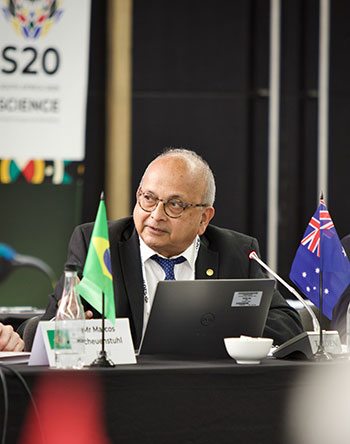
The Australian Academy of Science has endorsed the Science20 (S20) 2025 statement, Climate change and well-being, reinforcing a collective commitment and consensus-driven call to action for preserving lives and boosting global sustainability.
The communiqué was developed after an in-person meeting in Pretoria, South Africa, in February, attended by Academy Fellow Dr Surinder Singh and finalised with feedback and contributions from experts across the member academies, including Academy Foreign Secretary, Professor Frances Separovic AO, Professor Andy Pitman AO of UNSW, and Professor Hilary Bambrick of the Australian National University.
During the final S20 meeting, Professor Separovic stressed, "Australia can't act alone. Making greenhouse gas removal a national research priority means elevating global research collaboration in this area, pooling resources, and ensuring it is an international priority."
A call to action for climate change and human wellbeing
Climate change is one of the most pressing global challenges, with far-reaching consequences for health, livelihoods, food security, and water availability. Its impacts are disproportionately felt by vulnerable populations.
Rising temperatures, extreme weather events, and ecosystem degradation threaten human wellbeing and the stability of Earth's life-support systems.
The S20 communiqué emphasises the urgent need for coordinated, science-driven solutions to mitigate these threats.
The S20 Statement identifies five priority areas for action:
- Human and environmental health
Strengthen monitoring of air and water quality, build early warning systems, and protect communities from climate-related health risks.
- Food, water, and energy nexus
Promote climate-smart agriculture, support local food systems, and develop resource-efficient urban planning to safeguard essential resources.
- Indigenous peoples, local communities, and vulnerable populations
Integrate traditional knowledge, support community-led adaptation strategies, and ensure that early warning systems reach those most at risk.
- Climate change adaptation
Enhance climate-resilient infrastructure, improve access to climate data, and focus on ecosystem restoration to reduce vulnerability and protect biodiversity.
- Climate change mitigation
Accelerate emission reductions, promote renewable energy solutions, and invest in emerging technologies like carbon removal, ensuring strong governance and accountability.
Science at the heart of sustainable development
International scientific collaboration plays a pivotal role in achieving the United Nations' 17 Sustainable Development Goals (SDGs), which are integral to the 2030 Agenda for Sustainable Development. The S20 statement emphasises that science, through evidence-based policy, is key to realising these global goals.
The Australian Academy of Science congratulates the Academy of Science of South Africa for their dynamic leadership in coordinating this year's S20 meetings and producing a statement that will offer evidence-informed advice to the G20 heads of state and government.
Next year, the National Academy of Sciences will coordinate the S20 meetings under the United States' G20 Presidency.






